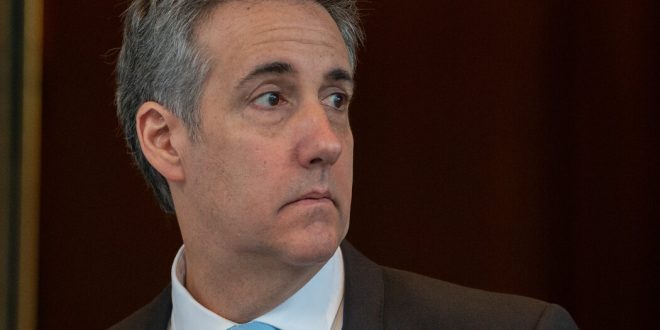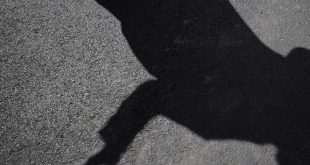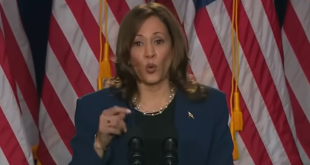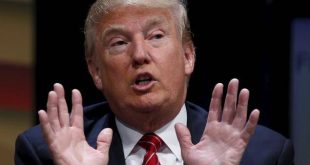It was — and remains — the ultimate litmus test for anyone in the orbit of Donald Trump: Are you loyal, or not?
The question percolated through today’s testimony by Michael Cohen, Trump’s longtime lawyer and fixer, whose second day on the stand also featured a furious pushback from defense lawyers. They painted Cohen as a liar and an opportunist obsessed with Trump — and bent on seeing him convicted.
The day was split: Cohen was on the stand for prosecutors before lunch, and in the afternoon faced a barrage of aggressive questions as cross-examination began.
Cohen said he abandoned his affiliation with the former president in the months after federal agents raided his house and office in April 2018, during Trump’s second year in the White House.
The raid partly involved Cohen’s $130,000 payment to Stormy Daniels, a porn star, to silence her account of a sexual encounter with Trump, the same event that precipitated the charges the former president is facing in a Manhattan courtroom. There, often glum, Trump has watched a procession of former employees and confidants take the stand as witnesses for the prosecution.
In a emotionally fraught moment today, Cohen described a conversation with his family in 2018 where he said they asked him a searing question: “Why are you holding on to this loyalty?”
“‘We are supposed to be your first loyalty,’” Cohen recalled his family saying, adding, “It was about time to listen to them.”
Cohen said his decision was to be loyal instead to “my wife, my son, my daughter, and the country,” eventually leading him to testify, as Manhattan prosecutors seek to prove that Trump falsified business records to hide Cohen’s reimbursement for the Daniels payoff.
Defense lawyers presented such testimony as nothing more than self-serving, self-justifying nonsense. Trump’s attorney, Todd Blanche, began a pitched cross-examination by asking if Cohen had called him a “crying little shit” in an online post.
“Sounds like something I would say,” Cohen quipped — before prosecutors lobbed an objection that was sustained.
‘The cult of Donald Trump’
Blanche soon began peppering Cohen with questions, eliciting a range of admissions, including that Cohen has defied requests from prosecutors not to speak, that he would like to see Trump convicted and that he has made money from his association with Trump, including from podcasts, books and online sales (including T-shirts reading “Convict 45”).
Blanche also confronted Cohen with his past praise of Trump, whom he had once called “a man who tells it straight.”
Cohen, who still lives in a building with Trump’s name on it, responded: “At that time I was knee deep in the cult of Donald Trump.”
The defense wanted Cohen to admit that he was only interested in money and saving his own skin, showing him notes in which Cohen wanted to know how he would benefit by helping the Manhattan district attorney’s office, which brought the case.
Blanche also bore into a series of lies Cohen has admitted to, including making false statements to Congress in 2017, something prosecutors elicited.
But Cohen batted back a suggestion by Blanche that he just wanted to be famous. He conceded he liked being on television, but said he was happier when he was representing Trump. In a lighter moment, Cohen said that he had begun podcasting to create community and to vent because he had “a difficult time sleeping.” (Not unlike other podcasters, perhaps.)
Trump, 77, has denied the charges and says he did not have sex with Daniels, who described their brief tryst in detailed testimony last week. While barred by the gag order from attacking jurors, witnesses and the judge’s family — an order he’s already violated 10 times — Trump used his daily remarks in the court hallway to praise those who came to praise him, who today included the speaker of the House, Mike Johnson.
“They are speaking very beautifully,” Trump said of his surrogates. “They come from all over Washington, and they’re highly respected and they think this is the biggest scam they’ve ever seen.”
Evidence in the courtroom was detailed, with prosecutors methodically walking Cohen through the checks he received from Trump to pay him back for the $130,000 he had sent to Daniels, something he said he did to assure her story “would not affect Mr. Trump’s chances of becoming president of the United States.”
“On whose direction and on whose behalf did you commit that crime?” Cohen was asked by a prosecutor, Susan Hoffinger.
“On behalf of Mr. Trump,” Cohen replied.
During about nine hours of direct testimony over two days, Cohen was largely calm, a far cry from the brash, brass-tacks lawyer jurors had been primed to expect by testimony from other witnesses.
He painted himself as an insecure operator in a world in which everyone around Trump tried to please him, all in the hopes of earning head-pats or, in Cohen’s case, protection. One such assurance came after the raid by federal agents, when Trump told him: “Don’t worry. I’m the president of the United States.”
Cohen’s onetime affection for the former president came up again and again. More recently, of course, Cohen has been less flattering, saying on social media that Trump should be in a cage “like an animal.” Such invective may come from bitter experience: Cohen testified he has lost his law license and has been forced to sell lucrative taxi medallions after his felony convictions.
Asked by Hoffinger, at the end of her questions, if he had regrets, Cohen said yes, he had a few.
“I don’t regret working at the Trump Organization, as I expressed before,” he said, before adding, “But to keep the loyalty and to do the things that he had asked me to do, I violated my moral compass.”
Here’s the team we have reporting on the trial. During the proceedings, we’ll be sending you updates more frequently, including breaking news alerts and our weekly analysis on Thursdays.
Your questions
We’re asking readers what they’d like to know about the Trump cases: the charges, the procedure, the important players or anything else. You can send us your question by filling out this form.
I am curious about how the NYT team is communicating from the courtroom. Are they in the courtroom? Are they typing on their phones? Do editors or others review/organize their comments, how delayed is the reporting? — Greg Smith, Centennial, Colo.
Jesse: Laptops are allowed in the courtroom, but not phone usage, so reporter updates are being sent via old-fashioned typing, with editors at Times headquarters fixing our errors and sometimes adding context before electronically publishing. In the overflow room, reporters can use laptops and text, though, like in the courtroom, photography and phone calls are strictly forbidden. Reports on the trial’s proceedings, fed into the Live section on the Times webpage, are generally pretty quick after the action in court, though longer items take, well, longer. We communicate with each other through Slack for the most part, and in conversations during our all-too-brief lunch hours.
What else to watch
-
Next week, in Florida, there will be the first of a series of hearings in Trump’s classified documents case that will stretch into late June. The hearing will concern an attempt by one of Trump’s co-defendants, Walt Nauta, to have the charges he is facing dismissed, including by arguing that he has been unfairly and vindictively prosecuted.
Where does each criminal case stand?
Trump is at the center of at least four separate criminal investigations, at both the state and federal levels, into matters related to his business and political careers. Here is where each case stands.
 Top Naija News – Nigeria News, Nigerian News & Top Stories Top Naija News – Nigerian Newspapers, Nigerian News. topnaijanews is a daily Nigerian newspaper covering Latest News, Breaking News, Entertainment, Sports, Lifestyle and Politics.
Top Naija News – Nigeria News, Nigerian News & Top Stories Top Naija News – Nigerian Newspapers, Nigerian News. topnaijanews is a daily Nigerian newspaper covering Latest News, Breaking News, Entertainment, Sports, Lifestyle and Politics.




